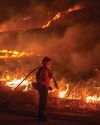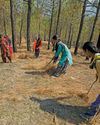
The carbon tariff would hurt developing countries' export earnings and shift the decarbonisation burden on them, while overlooking developed nations' climate responsibilities and green funding failures.
THE GLOBAL race to build a low-carbon economy is gaining momentum. But this much-needed push to reduce greenhouse gas (GHG) emissions has raised concerns about economic rivalry and trade protectionism. Under the guise of climate action, developed countries are trying to protect their domestic manufacturers from global competition while shifting their environmental responsibilities on others.
The European Union's (EU's) Carbon Border Adjustment Mechanism (CBAM) is a clear example of this. The initiative aims to impose a carbon tariff on imports of energy-intensive products, based on the GHG emissions generated during their production.
India, in its Economic Survey report released in July 2024, ahead of the Union Budget 2024-25, argues that CBAM and similar proposed measures from the US and the UK violate the Paris Agreement's principle of "Common but Differentiated Responsibilities", as developed countries shift the burden of climate finance from the Global North to the Global South through carbon taxes.
India's concerns are echoed by other developing nations. In June, South Africa condemned CBAM during the Ministerial Declaration for the High-Level Political Forum for Sustainable Development 2024, calling it an "extraterritorial, unilateral, coercive, and trade-distorting measure disguised as climate protection."
Diese Geschichte stammt aus der September 16, 2024-Ausgabe von Down To Earth.
Starten Sie Ihre 7-tägige kostenlose Testversion von Magzter GOLD, um auf Tausende kuratierte Premium-Storys sowie über 8.000 Zeitschriften und Zeitungen zuzugreifen.
Bereits Abonnent ? Anmelden
Diese Geschichte stammt aus der September 16, 2024-Ausgabe von Down To Earth.
Starten Sie Ihre 7-tägige kostenlose Testversion von Magzter GOLD, um auf Tausende kuratierte Premium-Storys sowie über 8.000 Zeitschriften und Zeitungen zuzugreifen.
Bereits Abonnent? Anmelden

THE CIRCULARITY ARGUMENT
A circular economy can help India achieve its developmental aspirations while following the low-carbon pathway. It will also help address the challenges of waste management, pollution and overexploitation of natural resources. Industries are already innovating to reuse high-volume wastes and have shown that the transition can usher in both environmental and financial windfalls

Banking on flawed drug voluntary licences
The Medicines Patent Pool is pushing for more VLs, but its bad deal with Novartis on a cancer drug shows the pitfalls

Lasting solutions
For the first time, the UN has recognised the role of indigenous communities in tackling aridity. A repository of traditional knowledge India has the wherewithal to lead the way

IMD at 150
India's journey into modern weather forecasting took a decisive turn 150 years ago with the establishment of India Meteorological Department during the British rule. The agency has come a long way since then, shaping the way the country predicts and responds to its diverse climate challenges

Every drop counts
In drought-prone Marathwada region, 14 villages have managed to counter water shortage by budgeting the resource

Threat to survival
Hollongapar Gibbon Sanctuary in Assam faces ecological challenges as railway electrification and hydrocarbon exploration endanger its fragile biodiversity

'Migration is going to be a battlefield'
AMITAV GHOSH is one of the foremost chroniclers of our times. His literary sojourn includes writings on topics that range from languages to climate change to human lives. His latest book, Wild Fictions, brings some of his works on these issues under one title. In a conversation with RAJAT GHAI, Ghosh shares his views on the future of human movement. Excerpts:

Face of future
California wildfires confirm forest fires are intensifying in a hotter world, emitting substantial amounts of greenhouse gases and reinforcing global warming

Friends of the forest
Residents of 30 villages in Uttarakhand establish a model for public participation in saving forests from wildfires

Climate-crazy playbook
Just hours after his second (and final) term began on January 20, US President Donald Trump unleashed 46 presidential actions. Several of these are centred on the US' climate commitments, energy transition, migration and trade policies, and are likely to have negative global implications